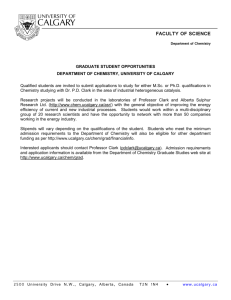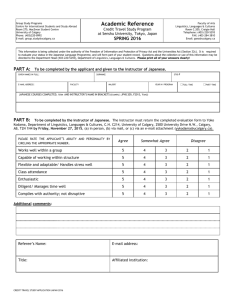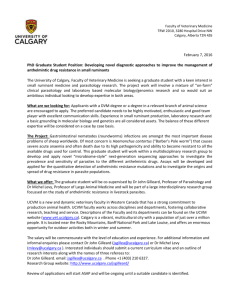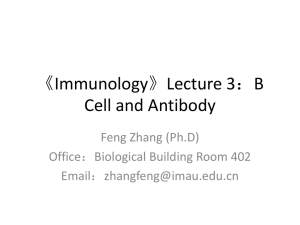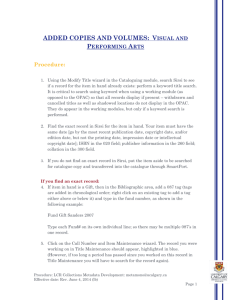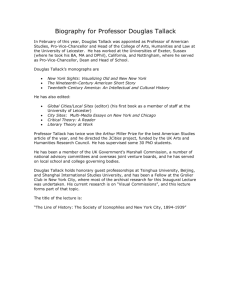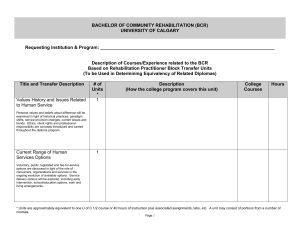(BCR) – Vancouver Regional Campus
advertisement
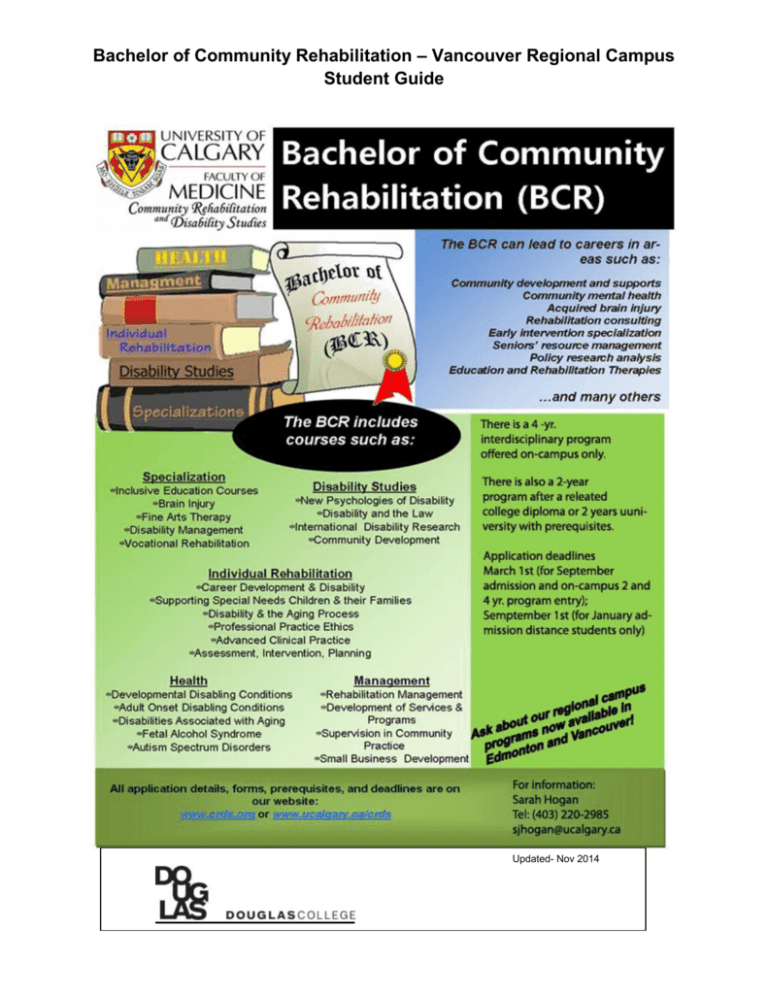
Bachelor of Community Rehabilitation – Vancouver Regional Campus Student Guide Updated- Nov 2014 Bachelor of Community Rehabilitation – Vancouver Regional Campus Student Guide Introduction Welcome to the University of Calgary - Community Rehabilitation & Disability Studies (CRDS) and the Douglas College -Faculty of Child, Family and Community Studies (CFCS), Bachelor of Community Rehabilitation (BCR) Vancouver Regional Campus Program. This program is a unique collaboration between two respected Canadian public post secondary institutions. It began in 1999 and continues to grow and develop innovative programming and partnership opportunities for the institutions, students and the communities they serve. Vancouver Regional Campus students enter the BCR program at year three, after completing an approved two year diploma. The BCR is an interdisciplinary degree. Both faculty and students come from a variety of backgrounds. Students take a range of courses from an assortment of areas, such as community rehabilitation, disability studies, health, management and social sciences. There is a great deal of flexibility in this degree. For example, students may take the program full time or part time and choose their individual course schedule and elective options. This flexibility bests serves student who are proactive independent problem solvers. Pre-requisites (in addition or as part of an approved diploma) Some approved diplomas already contain all courses required for formal admission, other approved diploma graduates require one or more pre-requisites. Approved diploma programs are listed on the crds.org website. Please see the Block Transfer link for details. For example, some of the most common pre-requisites are: Capilano University and Vancouver Community College Rehabilitation Assistant Diploma graduates require an academic writing course, e.g. English 100 or a BC Council on Articulation and Transfer (BCCAT) equivalent as a pre-requisite. Douglas College CCS, ECE, CSSW and CYC graduates require a first or second year junior human science prerequisite course, (e.g. BIO 1103, 1105,1110 or ANTR 1111) which can be completed after acceptance into the program. Other approved diplomas require a junior psychology course, e.g. PSYC 1100 or CFCS 1130, which can also be done after formal acceptance in the BCR program. Bachelor of Community Rehabilitation – Vancouver Regional Campus Student Guide Pre-requisites (for applicants who do not have an approved diploma) Applicants who have previous university transfer credits and want to enter the BCR at year three must either transfer into an approved diploma program or take a series of CRDS specific pre-requisites in person at the Calgary campus. Some prospective students who have at least thirteen university transfer courses and who complete a number CDRS specific courses, i.e. disability history and systems, communication skills, approaches to community rehabilitation, and a 230 hr practicum are also eligible for individual block transfer, please contact Beth Parrott the BCR Undergraduate Advisor for more information. Admission Process The admission process has several steps, since there are at least two institutions involved and three applications. Applicants first complete a general UCalgary admission form via Apply Alberta and then a specific BCR admission form. Please see the UCalgary website for the official admission requirements. The BCR specific forms are on the CRDS website and are numbered BCR form 1 (which all applicants must do) and BCR form 2 (graduates of approved diploma programs do NOT have to complete this form 2). Apply at www.crds.org/ by March 1st for September admission and by September 1st for January /admission. Currently, there is a $115 non-refundable application fee for the U of C application. You will be asked to forward several important documents to them, such as an official transcript that states your graduation with an approved diploma, etc. Program requirements Once admitted to the program, students complete 60-credits (20 upper level bachelor courses) to graduate with a Bachelor of Community Rehabilitation. There are eight required core courses and twelve option (elective) courses. Note: Students must take at least 10 (8 CORE plus 2 OPTION) out of the 20 courses from UCalgary. Also, once in the program, all VRC-BCR students are required to take the UCalgary’s ACWR 303 English course as one of their senior community rehabilitation option courses. It is offered online each winter through UCalgary). Students have ten years to complete the degree. Bachelor of Community Rehabilitation – Vancouver Regional Campus Student Guide The courses are offered in a combination of on-line and in-person delivery. BCR students will take most of their courses on-line from UCalgary BCR, however, one or two required BCR courses a year are typically offered in-person at Douglas College by UCalgary (BCR students need to remember what institution is actually offering the inperson courses on the Douglas campus, as it dictates registration, textbook purchase, tuition payment, etc These in-person UCalgary courses offered at Douglas are not guaranteed in a set schedule, offerings depend on institutional resources and the number of students who will register (there must be a minimum of 20 students to offer a course). It is also possible to take option/elective courses at other approved institutions. This flexibility makes the BCR degree accessible for BC students outside of the Lower Mainland. If a BCR student is interested in a 3rd or 4th year course at another public post secondary institution, including Douglas College, they must also request individual approval from the UCalgary BCR Student Advisor using the Letter of Permission form found at MyUofC Student Centre ( a UCalgary webspace that holds all of the student’s personal UC related information) and/ http://www.crds.org/online_apps/planner.shtml BEFORE they register. After successfully completing these courses, students must also remember to officially transfer the course credits to UCalgary. All course requirements and the breakdown of the type of required and option courses students take can be found at www.crds.org in an important document called the Student Planner. The student planner is updated on a regular basis. Employment Options for BCR Graduates A Bachelor of Community Rehabilitation graduate has a wide variety of employment and education options open to them. Some go on to teacher training and/or graduate degree programs, others work as professionals/managers in the health and human service system. For example, British Columbian BCR graduates work as Managers or Infant Development/Supported Childcare Consultants in social service agencies, as well as Facilitators for Community Living BC, and as Vocational Rehabilitation Counsellors for WorksafeBC, etc. It is incumbent on the student to investigate and confirm their plans with future post secondary institutions and employers, as there are more opportunities than can be listed here, as well, specific employment requirements can change overtime. Please see Appendix A for more information Bachelor of Community Rehabilitation – Vancouver Regional Campus Student Guide Important Contacts: University of Calgary- BCR Student Advisor: Sarah Hogan – CRDS Calgary sjhogan@ucalgary.ca phone 403-220-2985 Contact Sarah regarding: UCalgary and BCR admission, UCalgary course planning, BCR course registration, course equivalency approval and graduation requirements. Frequently Asked Questions: Does the flexibility of this degree outweigh the challenges of sometimes feeling you are on your own? Definitely yes, but the BCR-VRC flexibility and self-directed learning can sometimes be overwhelming for beginning students. Students who are coming out of a supportive closed diploma program may also feel ‘lost’ at the beginning. Never-the-less, with time, students realize that the flexibility works in their favour because of the increased choice and customization. Students take courses that suit their schedule, can be creative with Bachelor of Community Rehabilitation – Vancouver Regional Campus Student Guide the courses they take and can specialize in an area of particular interest. However, they must also be good problem solvers, proactive and individually accountable regarding program requirements and education planning. They also need patience, persistence and a sense of humour - working with two institutions means working with two sets of bureaucracies instead of one. Students will have to ask for program clarification and/or approval many times throughout their educational journey. Most contact with program representatives will be via email and should be done after the student has investigated all related resources.. In other words, this degree is not for students who want someone else to lay out their course schedule and then a lock-step progression through their courses until graduation. I am a 3rd or 4th year student in another degree program, e.g. CYC, TR, etc. Can I take BCR courses as electives? 1) Yes, as long as there is space in the course, you can use on-line or in-person BCR courses as electives. However, non BCR students must first apply as an University of Calgary "Open Studies" student at http://www.ucalgary.ca/prospectivestudents/openstudies/ Then they need to fax their UC student number, identifying info and a copy (not original) of their highschool and Douglas College transcripts to Beth Parrott at UCalgary 403-2206494. Beth is the Undergraduate Advisor of the Bachelor of Community Rehab. She will give you permission to register into the course. Her email is parrott@ucalgary.ca To see what courses are offered, please check http://www.crds.org/courses/current_offerings/index.shtml I want to become a BCR student. If I don’t have an approved diploma, where can I get the pre-requisites courses? You require at least thirteen university transfer courses plus seven BCR pre-requisite courses: CORE 205, 207, 209, 285, 287, APSY 419, BIOL 205 (which are only offered in Calgary). Or talk to a local college that offers an approved diploma, you may be able to transfer some of your credits into the diploma or challenge some courses via prior learning assessment and recognition (PLAR). Douglas College-Classroom and Community Support Diploma program is a popular choice because of their expertise in prior learning assessment. If this is an Alberta degree, how will it apply to BC? The Vancouver BCR program makes an effort to focus course content on the British Columbian context. In-person courses are typically taught by local instructors and option (elective) courses are developed applicable to BC health and human service system. The program has a local advisory committee made up of BC employers, professionals, Bachelor of Community Rehabilitation – Vancouver Regional Campus Student Guide academic partners, community members and program graduates. In other words, the Vancouver BCR program reflects the character and needs of the BC community Am I a University of Calgary student or a Douglas College student? Typically, both, but most importantly, you are a University of Calgary student. Even though this program is offered in collaboration between CRDS and Douglas College, you are first of all a University of Calgary student and have full access to the UC library and student services. You will be awarded your degree from the UC. Douglas College is the host of the Vancouver Regional Campus and sometimes the source of elective course credits. What do I do once I’m accepted to the BCR program? 2) Ensure you have also applied and been accepted as a Douglas College UCalgary BCR student at Douglas College (or any other BC post secondary institution where you want to take courses). 3) Refer to the BCR Student Planner document at http://www.crds.org/online_apps/planner.shtml, a. Note that UCalgary and Douglas College use slightly different descriptors: i. ½ course (UC) = 3-credit course (DC) ii. Option course (UC) = elective course (DC) 4) Scheduled courses are listed on the CRDS website and the tentative schedule of VRC courses is available to students from a CCSD coordinator or instructional facilitator. It is important to remember that this is a tentative document. You will need to confirm what is offered each semester with the appropriate institution. 5) Review what in-person at Douglas(sometimes referred to as “Vancouver”), but offered by BCR, BCR online and summer institute courses are available from UCalgary at http://www.crds.org/courses/current_offerings/index.shtml 6) Note that if you are registering for both A & B of a BCR spring/summer course, you must register for both courses individually. 7) Review what courses are available from Douglas College. Courses offered over the next several semesters can be found at https://banserv2.douglas.bc.ca/prod/wwskschd.SelClass?termtype=CRE 8) Make an individual education plan for the next two years (CORE courses offered at Douglas cycle every two years). You need to keep your plan up-to-date and revise as necessary throughout your educational journey. You can track your progress by using the template under “Student Tools” on the crds.org website: http://www.crds.org/student_tools.shtml Bachelor of Community Rehabilitation – Vancouver Regional Campus Student Guide How do I “keep in the loop” with the Vancouver Regional Campus students and the Douglas College/BCR Liaison representative? Make sure you are on Lori’s email list. Email her at woodsl@douglascollege.ca There is also an excellent Facebook page called “University of Calgary: Community Rehabilitation and Disability Studies” so that students can ask questions of BCR staff and share their suggestions and offer “words of wisdom” assistance to newer students. https://www.facebook.com/#!/groups/142457779213681/ If you are not sure how to get into the group, contact Sarah Hogan on Facebook or sjhogan@ucalgary.ca Your UCalgary Student Centre, and the CRDS newsletter are also good resources. But perhaps the best way to ‘keep-in-the-loop’ is to take the in-person UCalgary courses offered at Douglas College as your first priority. This is the only time you will be able to informally connect with other BCR-VRC students in-person. Significant reciprocal information and support can be gained from these relationships. How do I know what courses to take and when? In all, there are 8 required BCR courses and the remaining 12 courses are option (elective) courses from either CRDS or other institutions (including Douglas College). Note: You must take at least 10 out of the 20 courses from UCalgary There are usually 2-4 on-line or in-person BCR courses offered each semester, as well as multiple Interdisciplinary option courses from other institutions (including Douglas College). This information is also on the Student Planner http://www.crds.org/online_apps/planner.shtml . Please refer to the crds.org website under the courses link for more information. It is your responsibility to track courses taken and courses remaining. You might consider the required BCR CORE offered in-person at Douglas College a priority, since they are generally only scheduled every two years. Online Courses The UCalgary on-line courses are offered at least every year in one of three semesters. Each on-line course has a different schedule. Typically, the course are very flexible and do not involve daytime hours. Registered students will have access to the course Blackboard Learning Management System. UCalgary-offered In-person Courses* Bachelor of Community Rehabilitation – Vancouver Regional Campus Student Guide Note: The UCalgary in-person courses are typically only offered at the Douglas College campus every two years so if students do not take them when they’re offered, they will have to wait another two years for the course to cycle around again. This may change as more students prefer the online options, less in-person courses will be offered. The UC in-class courses at Douglas College are usually (but not always) offered on four Friday nights and all day Saturdays sessions to accommodate students who are working or traveling outside of the Lower Mainland. Douglas College-offered in-person courses Douglas College offers several applied degrees and upper level advanced certificates or diplomas, i.e. Business, Child and Youth Care, Coaching, Co-occuring Disorders, Criminology, Disability and Applied Behaviour Analysis, Psycho-Social Rehabilitation, Psychology, Therapeutic Recreation, etc. There may be space in several 3 rd or 4th year courses for interested students who receive prior approval from Beth Parrott. There are also a number of upper level university transfer (UT) courses which satisfy the health, management, social science and specialization options. Courses are typically less expensive than UCalgary courses and are offered in the evenings, although some may be scheduled for weekends or daytime. You will also need a Douglas College student number and a waiver from the Douglas program department where the course is located before you attempt to register. Pre-requisites might also apply, check with each department to see if they can be waived, given your previous course credits. How do I register for courses? If the courses are taken through the UCalgary (CRDS), you register on-line at www.ucalgary.ca You have to pay a $100 (approximate) deposit before you can register for a course. This deposit is included in the course fee total. Registration time typically happens in June for Fall and Winter terms and March for spring and summer terms. Register as soon as registration opens, since courses fill very quickly. In fact, you are strongly encouraged to register for your winter courses at the same time as you register for your fall courses. If the course is offered by Douglas College, you will register online at www.douglascollege.ca during your assigned registration period each semester. Make sure to pay your tuition before the fee payment deadline. What if I want to take a course outside of the UCalgary, including a Douglas College course? You can take a course outside of the University of Calgary/CRDS, but the Senior Social Science options must be the equivalent of a 3rd or 4th year university level course. Bachelor of Community Rehabilitation – Vancouver Regional Campus Student Guide Request a Letter of Permission by going on the U of C Portal – Student Center before you take the course to make sure the course is approved. This is an area where the flexibility of the program works in your favour. If there is a course that interests you outside of CRDS, once approved by the UCalgary BCR Student Advisor and/or is already listed in the BCR Student Planner, you can take it. What options (electives) can I take and how do I go about choosing my option course? There are two classes of interdisciplinary options, CRDS and other public post secondary institutions (which includes Douglas College). CRDS options that are part of the ongoing offerings are listed in the UCalgary calendar and online. Occasional offerings are announced on line on the CRDS website. These occasional courses are created at the request of students or the field to meet a specific need. Suggestions and approved interdisciplinary options within the U of C, Athabasca University, Douglas College and Mount Royal College are listed online in The Student Planner. These options fall into the following categories: Senior Community Rehabilitation Options (2 half courses), Health, Physiology and Disability (4 half courses), Senior Social Sciences (4 half courses) and Management (2 half courses). How do I access the UofC library? There are distant services for students off campus – can be contacted via www.ucalgary.ca via Research support →Libguides→CRDS How do I purchase books? If the course is offered by the University of Calgary, books can be purchased through the University of Calgary bookstore. Look up your course on-line at www.calgarybookstore.ca and it will tell you if you need to purchase a book. The bookstore is linked off of the UofC website. You can also ‘rent’ many online. Some courses will also use enduring article links instead of a paper textbook. If the course is offered by Douglas College, you can purchase the books through the Douglas College bookstore. Do I have to apply to graduate or is it “automatic” once I complete all courses and where do I attend the graduation ceremonies? You need to fill out the UCalgary Application for Degree on the Student Center by February 1st to graduate in June or August 1st to graduate in November. Can I apply to a graduate program with this bachelor degree? Bachelor of Community Rehabilitation – Vancouver Regional Campus Student Guide This degree is a respected full degree from a prominent Canadian University and can be used to apply to graduate programs. However, as stated previously, students are encouraged to do their own research regarding the graduate program’s admission requirements. If you are interested in the UCalgary Masters program, please refer to the cdrs.org website under the ‘graduate program’ section. Can I get a student loan with this program? Students must contact their local financial aid office. This process can be challenging for BCR-Vancouver Regional Campus students because you are a UC student, but living in BC. Also, for some student loans, students must be enrolled the equivalent of full-time studies (9-credits). Again, this can present some challenges for financial assistance because your courses can be taken through a numerous schools. Enquire about “split enrollment’ options. You’re encouraged to seek financial advice from Financial Aid at Douglas College before applying as student loan information can change without notice. Bachelor of Community Rehabilitation – Vancouver Regional Campus Student Guide Appendix A: Open Letter to BCR students from Nancy Marlett, UCalgary professor, You have already realized that we do not educate people for specific career tracks or call the Community Rehabilitation a profession although you get the best we can offer to make you competent as an interdisciplinary professional. That means that we hope that you will be able to work effectively across professions, services and systems, being able to synthesize knowledge and skills through the eyes of the person you are working with and for. What does that mean? 1. you know enough health to work within a health sector with the specifics about medications taught by your employer. Many of our graduates work within health regions - as early intervention specialists, as mental health workers on hospital units and especially in community mental health programs such as Job Clubs, ACT teams, street missions, drop in centres, etc. Graduates also find careers in long term care, and many outreach options offered by health authorities such as seniors outreach workers, hospital discharge workers etc. We have had graduates become managers and directors of health based programs in brain injury, neurology, mental health, spinal cord injury etc. 2. you know about psychology and educational models of intervention and therefore as our graduates have in the past, you can work in home based programs such as ABA, as a transition/ guidance counsellor in schools, in children's after school programs for troubled children, in adult training settings and supported employment. 3. you know about communities and facilitating inclusion and therefore can find work with inclusive initiatives such as school programs, supported employment, PLAN, community, independent living, job clubs, consumer led services such as CPA, CNIB etc. 4. you know about managing and supervising staff and therefore will likely find your self moving to positions of team leader, supervisor, on site trainer, program coordinator in programs ranging from day care settings, to volunteer matching services, respite care, family managed care (micro boards), group homes, enclave employment settings. 5. you know about disability and employment and therefore can apply to positions within Human Resources in companies, Long term disability management through insurance companies, Vocational rehabilitation companies. Bachelor of Community Rehabilitation – Vancouver Regional Campus Student Guide 6. you know about policy and systems and disability and therefore can seek work as public guardians, mental health advocates, Disability benefit workers. Other jobs in child welfare as disability specialists are just now beginning to open up. 7. you know about local government, accessible systems and therefore might end up working within city government on accessible transportation, supported housing, providing support to seniors centres, integrated city recreation. 8. you may decide that you would like to become a therapists and go on to become a physiotherapist, occupational therapist, speech and language pathologist. You could also enter psychology, nursing, medicine etc. 9. you may decide in a few years that you would really like to become a teacher and take a one or two year teaching degree 10. you may decide that Disability studies is for you and you could take graduate work to become a scientist, an academic and take over our jobs. I thought I wouldn't make it to 10 but it worked. Have fun with this, share it around with others and add to the list. Nancy Bachelor of Community Rehabilitation – Vancouver Regional Campus Student Guide Appendix C - Student Checklist Bachelor of Community Rehabilitation - Vancouver Regional Campus Please see appropriate resource(s) for details Before I apply: 1. Find out more information about the program: o Review the www.CRDS.org website carefully several times o Request the latest BCR-VRC Student Guide 2. Ensure I have an approved Diploma (see list on crds.org website: 3. Investigate funding possibilities 4. Prepare for a busy couple of years Application Process: Apply by deadlines Submit all required documents 1. Apply to UCalgary online 2. Apply to UCalgary-BCR Once accepted: 1. 2. 3. 4. 5. 6. 7. 8. 9. 10. Create your own course plan (see template on crds.org under “Student Tools”) Join Facebook group Check for course pre-requisites Submit letter of permission (LOP) Register for courses Buy textbooks Complete course(s) Update your course plan Transfer DC or other institutional credits to UC by having transcripts sent Apply to UC for graduate
